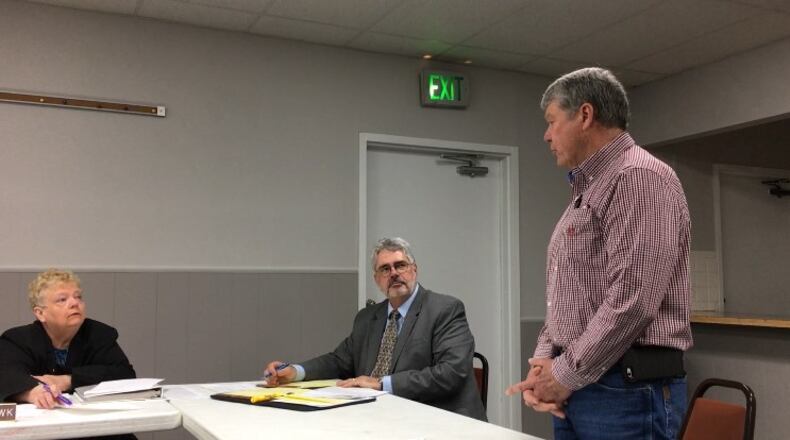Bath Twp. Trustees voted on the rule change last week. Trustee Kassie Lester voted against the rules, saying they made the township less transparent. Trustees Steve Ross and Tom Pitstick voted in favor of the rule change.
“If we know the answer, we should just give them the answer right there,” Lester said.
Bath Twp. Administrator Pete Bales said he proposed the new rules because some residents were asking questions that needed further research or were using public comment time inappropriately.
“When someone comes to the podium, typically, that is a comment period for them, they can make comments, and it’s not generally a back and forth discussion with the elected officials in most communities. But in Bath Twp., it seemed to be a time where citizens would come to the podium and ask multiple questions. And the trustees would do their best to answer them. But it’s hard when you’re on the spot, and you don’t have the resources to do research, to give those citizens the answers that they need, or deserve, or are entitled to,” Bales said.
Bath Twp. is currently involved in lawsuits over the operation of an anaerobic digestor in operation on the farm of Bath Twp. Trustee Tom Pitstick. Anerobic digesters are enclosed entities in which agricultural or food waste is stored and produce liquids and gases as the waste decomposes.
Neighbors have claimed the operation, called Dovetail, on Herr Road smells from miles away and is operating illegally. Residents upset over the Dovetail operation frequently speak and ask questions during the public comment time in township meetings.
In September of 2019, an independent zoning inspector found the Renergy site was not compliant with its agricultural zoning. In March of 2020, the Bath Twp. Board of Zoning Appeals ruled Renergy’s biodigester facility is not operating in accordance to its agricultural zoning, instead operating as a business more appropriate for industrial zoning. Renergy has appealed this ruling.
Renergy and Bath Twp. Trustee Tom Pitstick were sent a letter from an outside prosecutor saying that the operation was in violation of both the Ohio Revised Code and Bath Twp. zoning code. The letter stated that Dovetail had 30 days to correct the violation. “Failure to correct this violation with result in legal action,” the prosecutor stated in the letter. The bio-energy company has appealed that order and continues to operate today.
Luke Borntrager, who lives in Fairborn, has also filed a class action lawsuit against Renergy, Bath Twp. and Twp. Trustee Tom Pitstick in Greene County Common Pleas Court. The suit alleges that the smell from the operation has interfered with the residents’ use and enjoyment of their property. The lawsuit says a properly operated facility would prevent odors from invading nearby homes and property.
Renergy filed a motion in February to dismiss Borntrager’s case.
“We are involved in pending litigation and we should not be commenting on it,” Bales said of the new meeting rules. “So whenever there’s a question about Dovetail or the Dovetail lawsuit, as much as people want to know what’s going on, it is pending in court. And we should not be commenting on it. We should let our attorneys do that work.”
Bath Twp. had not previously had written meeting rules they were following, Bales said. This is the first set of rules they have officially adopted. Bales said the newly adopted rules will help township staff give the residents “the most thorough answer possible.”
“This is an effort to give the most thorough and complete answer,” Bales said. “When someone comes to the podium and they ask a question and we can unequivocally say ‘yes’ or ‘no,’ that’s the end of that. But, nine out of 10 questions are not that simple. I just feel like it gives the trustees of the township a better position to give the best answer.”
Lester said she’s heard from many residents who are upset about the rule change. Several residents spoke up about the new rules at the last township meeting saying that the township has a transparency problem. Lester said she does not agree with giving answers to questions in private, because if other residents had the same question they won’t be able to get that answer. Bales said he has not decided how he’ll give answers to questions not immediately answered.
“This is our issue, is transparency,” Lester said. “Let’s no do this on the side. If they ask a question and we don’t know the answer, let’s give it to them in the very next meeting.”
About the Author

